Sept. 20, 2025
10:30am
On September 20, 2025, Sue Big Oil Greater Victoria and Seniors for Climate hosted the Victoria Climate Impacts Bike Tour, led by Andrew Gage, Staff Lawyer with West Coast Environmental Law.
Missed it? You’re not too late – You can follow the route we took, through Vic West, Downtown, James Bay and Beacon Hill Park before ending at the Legislature Buildings. On the way you will look at sites that demonstrate the many ways that climate change is harming Victoria residents and driving up our cost of living.
For more information on the Climate Impacts Bike Tour, email sforcvictoria@gmail.com or info@suebigoil.ca.
Directions for the Focus on Climate Bike Tour
Meet at Caffe Fantastico at 398 Harbour Road, Victoria at 10 a.m. Come early if you want to get a coffee or a treat.
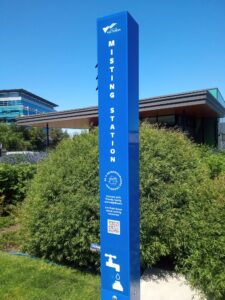 Across Harbour Road from Caffe Fantastico, you will see one of many misting stations installed after the 2021 Heat Dome that killed 29 Greater Victoria residents and injured perhaps 10 times that number. Misting and cooling stations are designed to keep people cool during heat waves and are increasingly a feature in parks and other locations.
Across Harbour Road from Caffe Fantastico, you will see one of many misting stations installed after the 2021 Heat Dome that killed 29 Greater Victoria residents and injured perhaps 10 times that number. Misting and cooling stations are designed to keep people cool during heat waves and are increasingly a feature in parks and other locations.
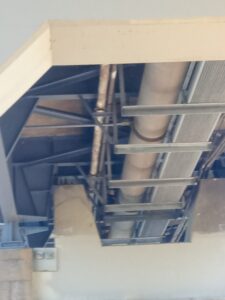 Water pipes under the Bay Street Bridge are a key part of Greater Victoria’s water system, and one of the few components visible above the ground in Victoria itself.
Water pipes under the Bay Street Bridge are a key part of Greater Victoria’s water system, and one of the few components visible above the ground in Victoria itself.
The CRD Water Board is planning a billion-dollar expansion and upgrade of the region’s water system, including these pipes. The largest expenses are a new water treatment facility and expanded reservoirs to address algal blooms and water scarcity due to climate change, driving up water rates and taxes.
Next steps: Return to the Harbour Road crossing. Go south on the bike lane on Harbour Road and after 83 metres turn left onto the bike approach to the Blue Bridge/Johnson St. bridge and cross the bridge. At Wharf St. turn left and go 300 metres to Fort St. Turn left onto the bike lanes on Fort St. to the corner of Douglas and Fort.
As you ride up towards the Johnson Street Bridge stop at the overpass. Just behind you on Esquimalt Road, you can see a Shell gas station. This station is the only one on our route, so a good time to reflect on the role of fossil fuel companies like Shell in causing the costs we are discussing on the tour. In 1989 Shell scientists summarized the science of climate change for the company, warning that if fossil fuel use continued to grow, “civilization could prove a fragile thing.” The reality is that global fossil fuel companies like Shell had a pretty good idea that they were selling products that would heat the planet and cause considerable harm to our communities – but they chose to lobby against climate action and spread misinformation. This is the type of behaviour that we can expect when companies expect to make massive profits without paying for a fair share of the harm they cause.
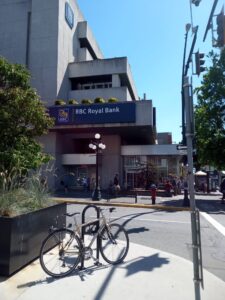 This is the financial district of Victoria. Note Royal Bank of Canada and Toronto Dominion Bank, as well as Coast Capital Savings Credit Union, on this corner. Banks provide money for profitable fossil fuel development, “earning” interest. However, the profits from fossil fuels do not reflect the costs incurred by the burning of these fuels.
This is the financial district of Victoria. Note Royal Bank of Canada and Toronto Dominion Bank, as well as Coast Capital Savings Credit Union, on this corner. Banks provide money for profitable fossil fuel development, “earning” interest. However, the profits from fossil fuels do not reflect the costs incurred by the burning of these fuels.
In addition, many of us buy our home and business insurance from banks and credit unions, and insurance is one of the areas where we experience the costs of climate change most directly. Premiums are rising due to increased risk of fires, floods, storms, and other climate-related issues. In some areas of the U.S., it is impossible to buy fire insurance due to climate change, and here in BC, premiums are rising dramatically.
The Insurance Bureau of Canada has said that without massive public expenditure to keep Canadian cities climate-safe, the country may become “uninsurable” within a decade.
Return west on Fort St. to Wharf St. Continue south on Wharf St. for 750 metres to Superior St. Turn right onto Superior St for 1.0 km. Turn left onto St Lawrence St for 32 m and turn right at the sign for Fisherman’s Wharf. Continue for 62 m and turn left for 70 m to reach your destination.
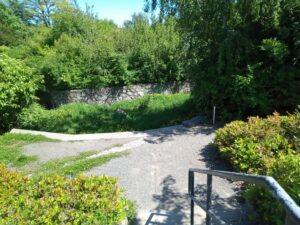 Increased precipitation from climate change means flooding, and flooding means we need to build different types of water systems. The rain gardens at Fisherman’s Wharf are a great example of climate adaptation, reducing impermeable surfaces in ways that allow water to soak back into the soil, avoiding flooding. But the costs of rebuilding our stormwater systems – as well as of dealing with flooding – can be considerable.
Increased precipitation from climate change means flooding, and flooding means we need to build different types of water systems. The rain gardens at Fisherman’s Wharf are a great example of climate adaptation, reducing impermeable surfaces in ways that allow water to soak back into the soil, avoiding flooding. But the costs of rebuilding our stormwater systems – as well as of dealing with flooding – can be considerable.
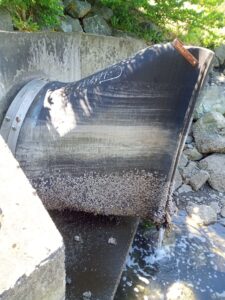 There are also duckbill valves installed next to the wharf. Rising sea levels and increased storms mean that we need new systems to prevent water from flowing back up the pipes and causing flooding.
There are also duckbill valves installed next to the wharf. Rising sea levels and increased storms mean that we need new systems to prevent water from flowing back up the pipes and causing flooding.
The next stop is 4-5 minutes (1.3 km) away. Go east back to the entrance to Fisherman’s Wharf Park. Turn right onto St. Lawrence St. (don’t turn right on Erie St.) and continue for 310 metres to Simcoe St. Turn left onto Simcoe for 800 m. and stop at the Thrifty’s parking lot.
 Growing food requires a stable climate, and unpredictable weather anywhere in the world can have an impact on global food prices. In BC, the BC Tree Fruits Cooperative closed its doors after 90 years, primarily due to several years of drought and unpredictable weather. Coffee, chocolate, olive oil, and many other crops have suffered global scarcity due to climate-fueled shifts in weather. There are many recent causes of rising food prices, but climate change is a significant one, and it is not going away.
Growing food requires a stable climate, and unpredictable weather anywhere in the world can have an impact on global food prices. In BC, the BC Tree Fruits Cooperative closed its doors after 90 years, primarily due to several years of drought and unpredictable weather. Coffee, chocolate, olive oil, and many other crops have suffered global scarcity due to climate-fueled shifts in weather. There are many recent causes of rising food prices, but climate change is a significant one, and it is not going away.
The next stop is 2.5 km. away. Get back on Simcoe St. going east, and turn right on Menzies. Go 450 metres to Dallas Road and turn left onto the bike path. Go east to Clover Point
These cliffs have a history of coastal erosion, made worse by climate change. The City has spent tens of millions of dollars stabilizing the cliffs, but rising sea levels and increasingly severe and frequent storms will only increase this erosion.
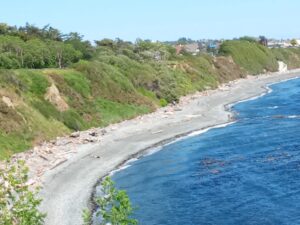
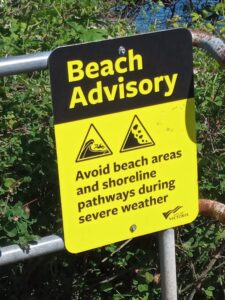
Although not visible from this location, slightly further down the shore is the Ross Bay Cemetery, which has graves from many of Victoria’s historic families. The cemetery is behind a sea wall and Dallas Road itself. During high tides and storms, waves regularly overtop the sea wall, washing onto the road and eroding the edge of the cemetery. In the long run, the City predicts that it may need to stop protecting the shoreline and allow the cemetery to be overtaken by the sea.
To continue to the next stop at Beacon Hill Park, return west along the Dallas Road bike path for 1.1 km. to the crossing into the park at Camas circle.
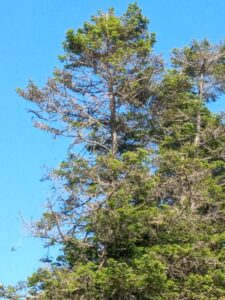 As you ride up Camas Circle, you will see on your right the third-tallest totem pole in the world, and, to the left of it, a Douglas fir tree struggling with disease and drought. Urban forests and green spaces help keep our communities cooler – you may have noticed that the temperature is milder since we biked into Beacon Hill Park. However, trees are under stress due to drought, and once under stress, they are more susceptible to disease. In addition, new pest species are expanding into newly warming climates. Academics have found that tree mortality in the Pacific Northwest is doubling every 17 years, partly due to climate change. The impacts are considerable on liveability and also on the costs associated with replanting and maintaining trees.
As you ride up Camas Circle, you will see on your right the third-tallest totem pole in the world, and, to the left of it, a Douglas fir tree struggling with disease and drought. Urban forests and green spaces help keep our communities cooler – you may have noticed that the temperature is milder since we biked into Beacon Hill Park. However, trees are under stress due to drought, and once under stress, they are more susceptible to disease. In addition, new pest species are expanding into newly warming climates. Academics have found that tree mortality in the Pacific Northwest is doubling every 17 years, partly due to climate change. The impacts are considerable on liveability and also on the costs associated with replanting and maintaining trees.
The next stop is at the Victoria Fire Station #2 on Michigan Street.
Get back onto Camas Circle, and bike 230 metres, continuing onto Circle Drive. After 200 metres, turn right onto Chestnut Row. 200 metres further, turn left onto Bridge Way.
We tend to think of Victoria as safe from wildfires, although some years the smoke from wildfires throughout the Province turns our sun orange, prevents kids from playing outdoors and requires us to buy air filters. But the reality is that heatwaves make the risks of urban fires higher as well, requiring communities like Victoria to increase its spending on fire fighting and prevention, and increasing our insurance premiums.
Our next stop will be the BC Legislature. Continue down Michigan Street another 120 metres. Turn right onto Government Street and travel for 280 metres. Turn left into the BC Legislature.
As we end at the Legislature, think about the many impacts and costs of climate change we’ve seen on our short ride and the roles of laws and government in causing and fighting climate change.
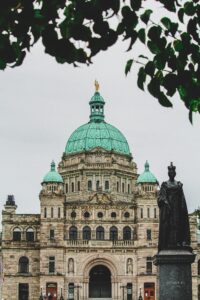
Many of the types of impacts we have seen and talked about require government action to protect residents and to deal with disasters when they occur. The result is higher taxes. BC in 2023 spent over $1 billion in fighting fires – those costs are paid by us, as taxpayers.
These impacts are occurring because the world has warmed by an average of about 1.5°C (higher here in Canada), but even small shifts in temperature can have significant impacts on human-made systems and ecosystems. Right now, our legal system is not doing enough to protect us from these costs. Both fossil fuel companies and governments have known for decades that climate change would cause these and even more serious impacts. So far, taxpayers have been targeted for most of the associated costs.
On September 20th we joined the Draw the Line event at noon at the BC Legislature. We encourage others who are following this tour route to spend a moment to think about what they might do to encourage climate action and demand accountability from fossil fuel companies.
This page was updated on November 20, 2025.